Filter by
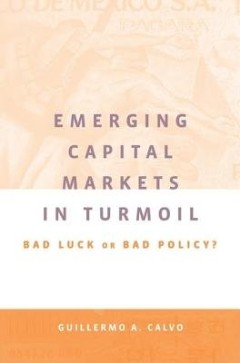
Emerging Capital Markets in Turmoil: Bad Luck or Bad Policy?
Analysis of financial crises in emerging market economies, including Mexico, Argentina, and Russia; traces the evolution of crisis theory and challenges the conventional wisdom.Since the mid-1990s, emerging market economies have been hit by dramatic highs and lows: lifted by large capital inflows, then plunged into chaos by constrained credit and out-of-control exchange rates. The conventional …
- Edition
- -
- ISBN/ISSN
- 9780262269728
- Collation
- 1 online resource (xiii, 547 pages) :illustrations
- Series Title
- -
- Call Number
- -
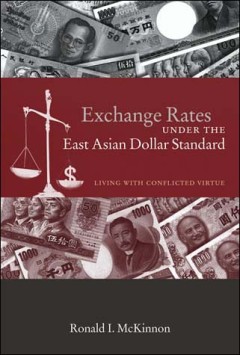
Exchange Rates under the East Asian Dollar Standard: Living with Conflicted V…
Essays by prominent scholars and policymakers honor one of the most influential macroeconomists of the last thirty years discussing the themes behind his work.OCLC-licensed vendor bibliographic record.
- Edition
- -
- ISBN/ISSN
- 9780262279550
- Collation
- 1 online resource (xix, 491 pages) :illustrations
- Series Title
- -
- Call Number
- -
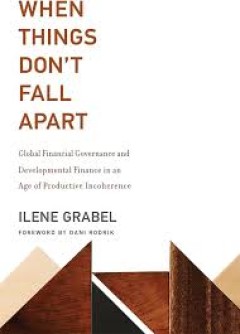
When things don't fall apart :global financial governance and developmental f…
An account of the significant though gradual, uneven, disconnected, ad hoc, and pragmatic innovations in global financial governance and developmental finance induced by the global financial crisis. In When Things Don't Fall Apart, Ilene Grabel challenges the dominant view that the global financial crisis had little effect on global financial governance and developmental finance. Most observers…
- Edition
- -
- ISBN/ISSN
- 9780262344043
- Collation
- 1 online resource (xxi, 372 pages)
- Series Title
- -
- Call Number
- -

Capital Flows and Crises
The implications of capital mobility for growth and stability are some of the most contentious and least understood contemporary issues in economics. In this book, Barry Eichengreen discusses historical, theoretical, empirical, and policy aspects of the effects, both positive and negative, of capital flows. He focuses on the connections between capital flows and crises as well as on those betwe…
- Edition
- -
- ISBN/ISSN
- 9780262272186
- Collation
- 1 online resource (viii, 377 pages) :illustrations
- Series Title
- -
- Call Number
- -
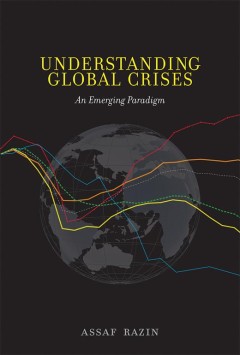
Understanding global crises : an emerging paradigm
This book offers a review of an emerging paradigm that is consistent with the key features of recent global financial crises. This paradigm presents in a transparent way basic analytical elements of the theories of financial and monetary crises and how these elements fit together in macroeconomic analysis of global crises. Razin surveys the credit implosion that led to a severe banking crisis i…
- Edition
- -
- ISBN/ISSN
- 9780262327701
- Collation
- 1 online resource
- Series Title
- -
- Call Number
- -
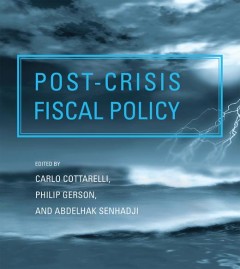
Post-crisis fiscal policy
Fiscal policy makers have faced an extraordinarily challenging environment over the last few years. At the outset of the global financial crisis, the International Monetary Fund (IMF) for the first time advocated a fiscal expansion across all countries able to afford it, a seeming departure from the long-held consensus among economists that monetary policy rather than fiscal policy was the appr…
- Edition
- -
- ISBN/ISSN
- 9780262324113
- Collation
- 1 online resource (vii, 562 pages) :illustrations
- Series Title
- -
- Call Number
- -
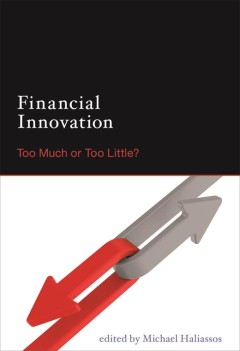
Financial innovation :too much or too little?
This text, which includes two contributions from Robert Shiller as well as a discussion of Shiller's 'MacroMarkets' tool, considers the key ingredients of financial innovation from both academia and industry; the postive potential but also the risks of financial innovation and the influence of producers on consumers.OCLC-licensed vendor bibliographic record.
- Edition
- -
- ISBN/ISSN
- 9780262305495
- Collation
- 1 online resource (xxii, 252 pages) :illustrations
- Series Title
- -
- Call Number
- -
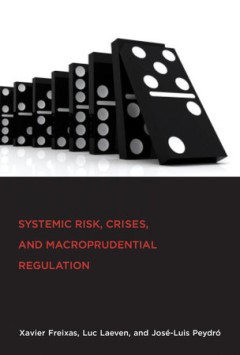
Systemic risk, crises, and macroprudential regulation
Offering a framework for understanding the reasons for the regulatory shift from a microprudential to a macroprudential approach to financial regulation, this book provides a list of challenges in the implementation of macroprudential policy and a discussion on its limitations. --OCLC-licensed vendor bibliographic record.
- Edition
- -
- ISBN/ISSN
- 9780262328609
- Collation
- 1 online resource (xiii, 472 pages) :illustrations
- Series Title
- -
- Call Number
- -
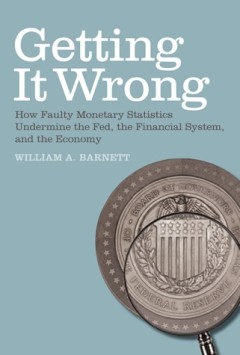
Getting it Wrong: How Faulty Monetary Statistics Undermine the Fed, the Finan…
Blame for the recent financial crisis and subsequent recession has commonly been assigned to everyone from Wall Street firms to individual homeowners. It has been widely argued that the crisis and recession were caused by "greed" and the failure of mainstream economics. In this book, leading economist William Barnett argues instead that there was too little use of the relevant economics, especi…
- Edition
- -
- ISBN/ISSN
- 9780262301343
- Collation
- 1 online resource (xxxi, 322 pages) :illustrations
- Series Title
- -
- Call Number
- -

Economics in the Age of COVID-19
A guide to the pandemic economy: essential reading about the long-term implications of our current crisis. The COVID-19 pandemic has unleashed a firehose of information (much of it wrong) and an avalanche of opinions (many of them ill-founded). Most of us are so distracted by the everyday awfulness that we don't see the broader issues in play. In this book, economist Joshua Gans steps back from…
- Edition
- -
- ISBN/ISSN
- 9780262362801
- Collation
- 1 online resource.
- Series Title
- -
- Call Number
- -
 Computer Science, Information & General Works
Computer Science, Information & General Works  Philosophy & Psychology
Philosophy & Psychology  Religion
Religion  Social Sciences
Social Sciences  Language
Language  Pure Science
Pure Science  Applied Sciences
Applied Sciences  Art & Recreation
Art & Recreation  Literature
Literature  History & Geography
History & Geography